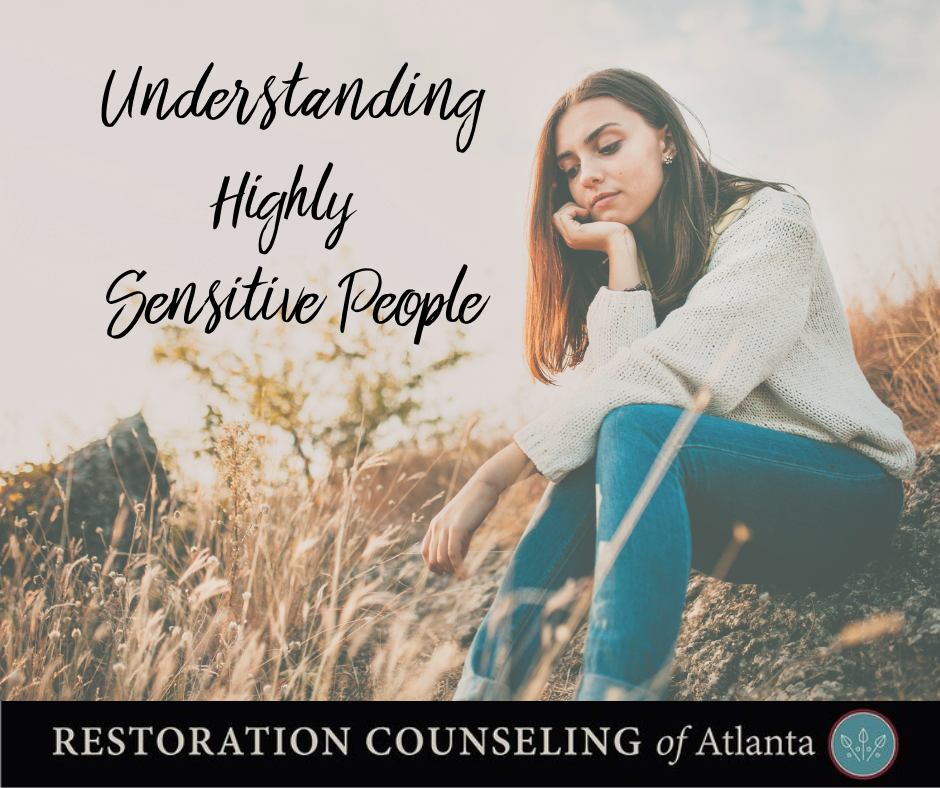Maybe you’ve wondered if you are a highly sensitive person (HSP) or if your spouse or child is a highly sensitive person. An HSP may face challenges as they learn how to navigate and experience the world. Of course, they aren’t trying to make challenges for themselves or those they love; it’s just how they experience the world. It’s best to think of this as a personality trait for some individuals who are more responsive to positive and negative influences. This group is believed to make up about 20% of the population and has some similarities to introversion.
What is a Highly Sensitive Person?
Scientists initially coined the term Sensory Processing Sensitivity (not to be confused with Sensory Processing Disorder), and it was brought into popularity by Dr. Elaine Aron. She is the author of books for adults and children on this topic. Since then, many studies have concluded that there seems to be a genetic root to these sensitivities, but exact links are not yet determined.
The simplest detailed definition of HSP comes from the acronym DOES:
D – Depth of Processing – Observing and reflecting before acting
O – Easily Overstimulated – Paying attention to everything is exhausting
E – Emphasis on Emotional Reactions – Extremely empathetic
S – Sensitive to Subtleties – They notice all the things around them
More About “DOES”
Depth of Processing
It is helpful to understand each of these elements in greater detail. As mentioned, the D stands for Depth of Processing. This area can account for the reason that some HSPs are slow to speak and take extra time considering the different aspects of any given situation. Brain scans have found that their minds are more active considering the things they notice and the previous relationships they have experienced. When they have a troubling experience with a situation, this can sometimes account for why they might have more anxiety or depression than an HSP without a negative experience.
Overstimulated
The Overstimulated part of the DOES acronym speaks to the many things that the HSP is noticing. They can easily notice environmental factors and visual facial cues. However, eventually, these things accumulate and create fatigue even in the most gifted HSPs. When this happens, they do best with some low stimulation moments and quiet.
Emotional Reactions
The Emotional Reactions area relates to how a person responds emotionally to what they see and hear. Interestingly, brain scans have found a high level of brain activity when HSPs see images of beauty, and these emotionally move them. The letter E also stands for the high level of empathy they offer to others and experience for others in any given situation. The mirror neurons in HSPs let them do more than understand others’ feelings; they feel them too. HSPs typically have more emotional reactions to positive emotions such as curiosity, anticipation, joy, satisfaction, and contentedness.
Subtleties
This S stands for subtleties and denotes the great skill HSPs have with noting the subtleties. Their attention to subtleties is part of what enriches their world and enables them to connect more deeply with others, particularly around empathy.
Scientists have found genetic evidence related to the causes for HSP, but it is significant to note that negative developmental experiences don’t seem to cause HSP. However, studies also found that difficult developmental experiences create differential susceptibility. This means that those difficulties will cause more anxiety and depression in HSPs as they grow into adulthood. Interestingly, studies have also shown that young HSPs exposed to interventions and training can significantly benefit and improve their growth and reduce their battles with depression and anxiety.
Challenging Markers of an HSP
- HSPs don’t do well when they are rushed and feel that they have a shortened period of time. These triggers overwhelm them.
- They hate to let others down since they are very attuned to the feelings of others; they hate disappointing anyone.
- HSPs feel responsible for the emotions of those around them since they are aware of the negative emotions floating around them.
- Conflict creates significant stress for HSPs because they keenly sense the emotional state of others and manage the assumptions of what these sensations mean.
- HSPs are prone to struggle with social comparison because they can sense others’ reactions, and they are also very aware of their own improvement needs.
- They are more likely to ruminate on their losses since they feel them so acutely.
- HSPs can experience distractions of sound, smell, or messy environments as loud enough to reduce their productivity or create unnecessary stress for them.
- HSPs are often very vulnerable to the absence of sun and struggle from Seasonal Affective Disorder. (Therapy lamps can be beneficial in this case).
Things that help HSPs
It is important to note that the Overstimulation part of DOES is the only notable negative element and is easily managed with more breaks and quiet time. The following are active tips that HSPs can use to make their world and lives better.
- Pursue Positive Experiences – Adding positive experiences to your daily life can reduce the stress and contract the way other “normal” experiences create unwanted stress for HSPs.
- Avoid Stress-Based Entertainment – These experiences will sap your energy, place harsh demands on you, and make it more challenging to get back to a positive space.
- Activate Limitations – Learning to say no to things and preventing demand can provide a calmer life for the HSP.
- Pursue A Calming Home – When your home is soothing, it can make a significant difference for HSPs; it can be a place of rest and peace.
- Pursing Mindfulness – HSPs benefit from cultivating nonreactivity, nonjudging, acceptance, stating feelings, and acting out of awareness. It can make a massive impact on the reduction of the natural amount of anxiety that HSPs often battle.
These tactics can make a significant impact on the HSP’s overall composure. They can help reduce depression and anxiety, even if it originated based on other childhood trauma. HSPs respond very well to coaching and therapy, which gives them a place to work through the intensity of the feelings and practice these positive traits. HSPs need to learn to identify what they feel and how they feel. It is critical to learn that the reality is that these feelings will not last forever, even if they are very intense at any given moment.
Active Ways to Love the HSP in Your World
HSPs regularly report longing for deep and meaningful conversations to process their profound thoughts, feelings, and experiences with others.
Providing this for your HSP deepens their bond and connection with you and helps them normalize the many additional things they notice on any given day. As HSPs discover how and why their world impacts them the way it does, offer them loving support.
Please refrain from making fun of their sensitivities and the ways they seem quickly overwhelmed by things that don’t bother you. Instead, encourage them to pursue the tranquility they need to thrive. Remember to cherish the rich way your HSP loves you and the world. Their depth of personhood is something to be treasured.
Gratitude for the HSPs in our World
It is essential to conclude that HSPs are who they are. They can’t change these parts of themselves, and they would do best to accept who they are. They need to know how to take care of themselves, pursue help when needed, and encourage others in their lives to appreciate the benefits they bring. When those things happen, it makes a better environment for everyone. Remember that HSPs are in the minority, though not alone. We encourage you to learn more about HSPs and embrace them in your life.

Written by: Jennifer Stuckert, Clinical Director, LPC
Roswell Location
jennifer@restorationcounselingatl.com, ext. 111
Jennifer uses distinctly Christian counseling to help struggling individuals, couples, and families. Since 2009, she has served as the director and supervisor of the staff of Restoration Counseling of Atlanta. She has two decades of counseling experience and helping people gain relief from life challenges. Jennifer uses biblically sound methods with a specific emphasis on adaption according to personality and learning styles. She is certified in EMDR and completed extensive course work in Sexual Addiction Counseling.

